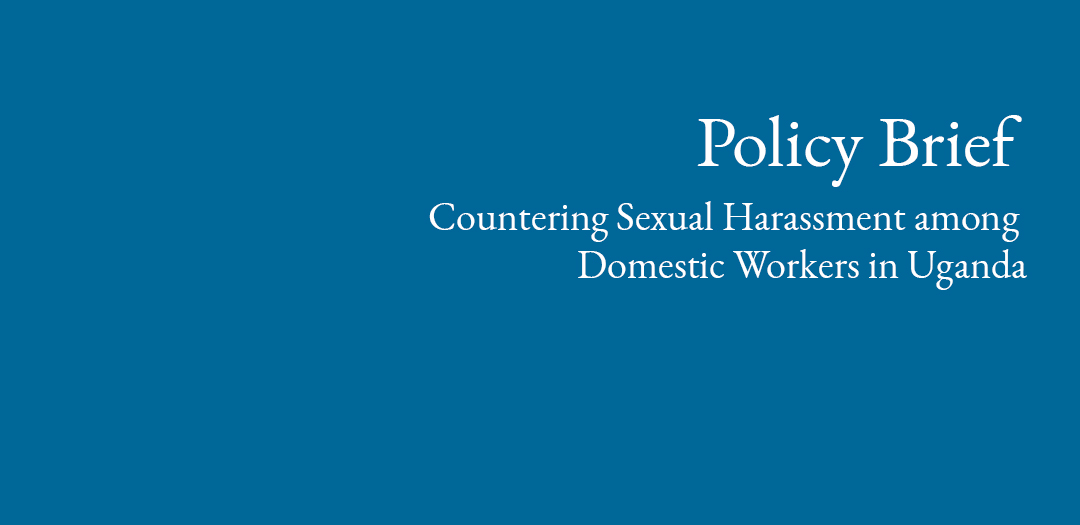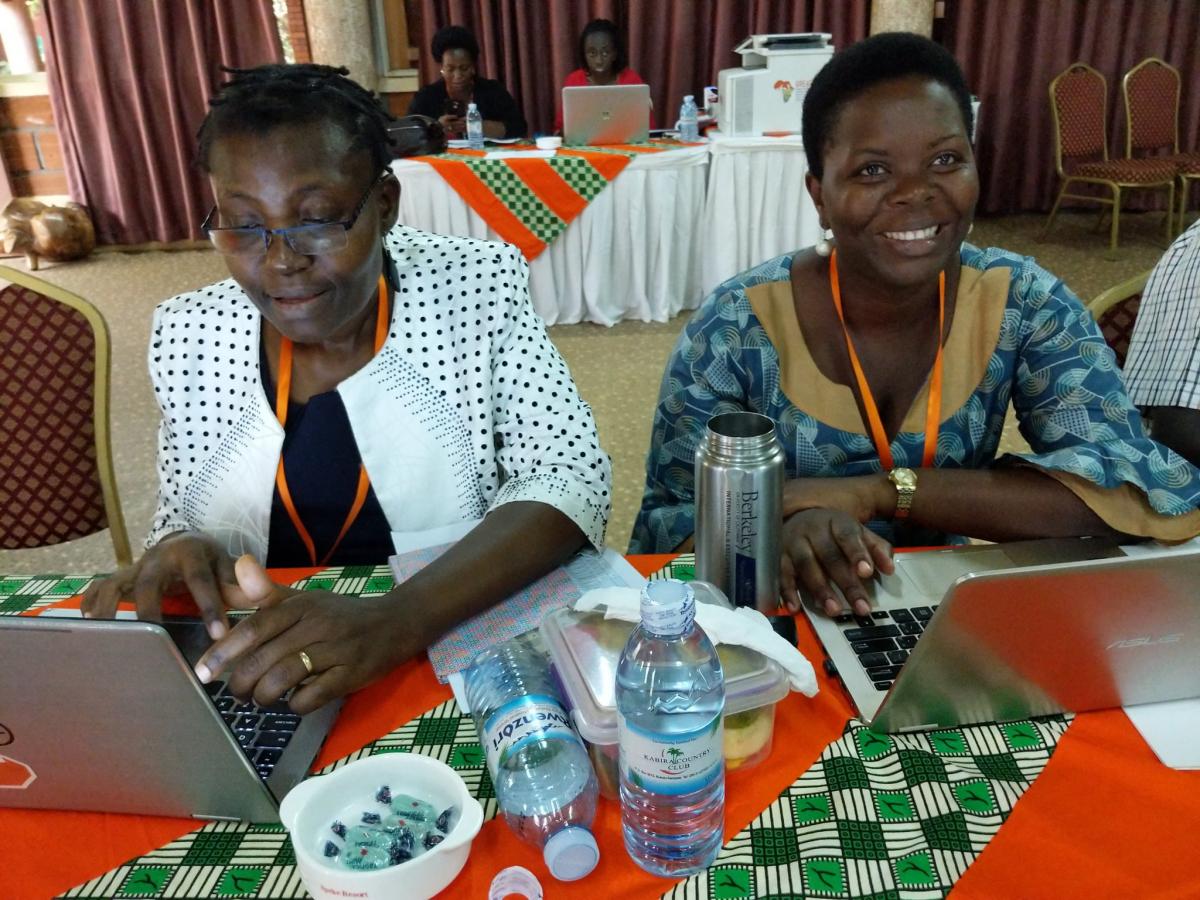Policy Brief – Countering Sexual Harassment among Domestic Workers in Uganda

Written by Victoria Flavia Namuggala (Makerere University) & Prosperous Nankindu (Kyambogo University)
Executive statement
This policy brief focuses on the plight of young women working as live-in domestic workers in Kampala’s informal settlements. We discuss the nature of sexual harassment they endure, factors explaining their vulnerability to sexual harassment, factors influencing their voice and agency, as well as approaches to improving reporting. We argue that culture and norms play a big role in determining young women’s conduct in relation to sexual harassment. This highly intersects with the age and level of education, socio-class and longevity at work. We conclude that domestic workers deserve to be treated with similar standards as other (public) workers. It’s thus crucial for government to implement work policies including setting up of a minimum wage, issuance of contracts and anti- sexual harassment policies.
Key messages
- Isolation and confinement are the leading risk factors for sexual harassment against domestic workers. Limited freedom of movement and association creates vulnerability by limiting access to information.
- All young women involved in the study had suffered sexual harassment. It is a big problem and most often in the form of sexual violence including rape and assault. These result into unwanted pregnancies and HIV infection.
- Sexual harassment survivors lack awareness and support. It is not clear for them where to seek help relating to sexual harassment. This greatly affects voicing and reporting as well as seeking justice. Consequently, majority of the survivors resort to informal structures.
- Socio-cultural norms normalize and accommodate sexual harassment, block reporting and voicing by the survivors. There is also a challenge of language when it comes to reporting. Language relating to sexuality is considered improper to use in public spaces.
Context
Uganda has several labor laws including the workers compensation Act 2000, the minimum wages Act 2000, the employment act 2006, the labor union arbitration and settlement act 2006, the occupational safety act 2006 and the employment (sexual harassment) regulations (2012) which requires that organizations with more than 25 employees adopt a written anti sexual harassment policy and set up sexual harassment committees. Whole these frameworks are in place, implementation is limited. It is especially evident in informal sector employment
Over 90%of the youth in Uganda work in informal employment (UBOS 2018); and about 58% of the employed youth are classified as being involved in “ vulnerable employment”, with the proportion for females at 67%. While no data exists on the exact number of domestic workers in Uganda, the National Employment Policy recognizes that ‘domestic servants’ are among the most vulnerable and are poorly protected (GoU 2011: 20,27). They are vulnerable to exploitation, including physical, psychological and sexual abuse[i]. Sexual harassment is manifested in verbal abuse, insults and intimidation with real or threatening retaliation, as well as victim blaming. Other forms include suggestive gestures, sexual jokes and comments (Newman, et al. 2021). It is very common for households to have domestic workers, especially when female adult household members engage in work outside the home. Public employment of women has thus created new dynamics in the domestic spaces. In Uganda, Sexual Harassment at the work place presents as a silent and apparently unregulated problem.
Sexual harassment at the work place mainly affects the female employees and it intersects concurrently with other forms of gender discrimination”
(Newman, et al. 2021)
It is a problem in various public sector levels including the parliament[1], the police force[1] and most important for this report in agriculture and public markets [1]. Economic independence of women thus brings on new forms of exclusion and re-assertion of male authority[1]and control over the women.
Domestic workers are susceptible to economic and sexual exploitation due to lack of regulations relating to their employment relationship. There is no defined terms of reference for domestic workers.
There are also poor working conditions including working for long hours, degrading human treatment and open discrimination. Young women also stand high risks of sexual abuse due to lack of terms of reference. Cleaning employers’ bedrooms for instance creates vulnerability for the maids. Some maids explained that males use that as an excuse to call them to the bedrooms with the pretext of complaining about poor cleaning and in the process they harass them. It is thus crucial to formal structures detailing the nature of work that a domestic worker is to be engaged in to avoid such conduct.
Factors contributing to young women’s vulnerability to sexual harassment
Domestic workers’ vulnerability to sexual harassment is intersectional at different levels. A combination of individual, relational, community, and societal factors contribute to this high risk. Sexual harassment is an act of power and control and includes a wide range of abusive acts[1]. Power imbalances are heightened by gender, age, cultural and social norms, levels of education, poverty and migration status. Adherence to socio-cultural and gender norms thus creates a risk for sexual harassment.
Socio-cultural norms: Sexual conduct is private affair that is not expected to feature in public spaces. Sexual Harassment manifests in actions that are often neglected since socialization trains both men and women to not only expect but also accept such conduct. There is a strong connection between masculinity and violence against women. Masculinity thus endows men with opportunities comprising sex, which men must access when they wish to[1]. Gender norms also influence agency as young women fear of reporting and the shame and blame associated to harassment. Besides gender, age plays acritical role in perpetrating sexual harassment. Socio-culturally younger persons are not expected to speak back, more so in opposing ways to elders. Young women are thus doubly bound by gender and age.
Poverty and lack of alternative employment opportunities: This offers the survivors no option but rather endure sexual harassment just to ensure survival. Survivors fear reporting since this may result into dismissal from the job. Self-employment initiatives may thus sustainably undermine work place sexual harassment.
Limited access to information: is also demonstrated in denial of access to news channels including television. Some maids detailed that they were not allowed to keep in the sitting/living room yet that’s where the tv set is located.
Confinement: There are less chances for domestic workers awareness and reporting sexual harassment given the limited networks. The majority of domestic workers explained movement restrictions put by their employers. Others also mentioned that refusal by employers to own mobile phones. In such cases they are totally cut off from family and friends hence affecting their agency.
Policy and justice frameworks: Some key stakeholders in the justice seeking system are insensitive to sexual harassment cases. They don’t accord such cases the attention they deserve. It was noted that some cases back to the informal structures instead of handling them as criminal offenses.
Why many don’t report
Language: The vocabulary to describe forms of harassment is inadequate. It leads to confusion and destruction of meaning in ways that make it hard to talk about sexual harassment without either trivializing it, challenging the factors that enable it, or getting so specific without becoming scandalous. Many words in Luganda, the local language in the area of study, are taken to be obscene which hinders voice and agency. In some cases, a victim may use a different word that does not exactly reveal what has actually happened to her, fearing she might sound vulgar, thus causing destruction and or confusion. The words used in reporting are usually polished. For example, “ankutte” is used when women report rape, but its original meaning is “has touched me”. It is difficult for the victim to express the deed of forced penetrative sex. A victim can’t utter it in court, or in front of police or local leaders.
Police and justice actors: Whilethey are key stakeholders in the justice system, domestic workers reported that they are insensitive to sexual harassment cases. They don’t offer such cases the attention they deserve, and suggest the woman is to blame for having attracted romantic attention. It was noted that some cases are sent back to informal processes instead of handling them as criminal offences.
Factors enabling voice and agency
The language used by young women with peers tends to be more explicit and specific. They directly tend to quote the exact words used by the perpetrator and describe their actions.
The research showed that a limited number of women reported incidents of sexual harassment. Where this happened, women were most likely to seek support from local councils (especially female councilors) and informal structures like elders within the community and religious leaders. The Local Council (female councilors) provided moral support to domestic workers and might talk to employers to amicably handle the cases without breaking marriages. The religious leaders provide counselling and support to domestic workers, offering solace and a sense of belonging. The elders advised domestic workers on how to respond sexual harassment without causing chaos within the family and the community; and discouraged girls from getting involved with married men. While these actions may have supported the worker, they rarely challenge the perpetrators, and reinforce gender norms that stand in the way of tackling harassment.
The study concludes that short- and medium-term actions are needed to support the working conditions and voice of domestic workers; the gender-sensitive functioning of the police, local councils and justice institutions; and that longer-term strategies are needed to shift social norms that cause and sustain the normalisation of sexual harassment.
Recommendations
- The Government and civil society need to embark on a large-scale sensitization and awareness campaign targeting domestic workers, their employers and other key stakeholders including local leaders, community elders, religious and cultural leaders to challenge the prevalence of sexual harassment.
- The Government needs to eradicate all fees required for reporting, filing and follow-up on sexual harassment cases to the police (including file fees and check-ups).
- Police and health workers need to be sensitized on how to respond to women who report sexual harassment.
- Digital reporting mechanisms, which reduce face-to-face interactions with those handling the cases, can offer an opportunity for domestic workers to report cases without having to explain details in public.
- Local councils can play a role in mitigating the isolation of domestic workers and creating opportunities for them to meet others. Registration of domestic workers at the local council level can help with networking and easy follow-up in case of any problems.
- Civil society actors need to develop strategies to identify domestic workers and raise awareness about sexual harassment, tackle stigma and taboos, offer safe reporting mechanisms and support.
Acknowledgements
This project has been implemented in a consortium involving; Makerere University, School of Women and Gender Studies, Institute of Social Transformation as the civil society partner and the Institute of Development Studies (UK) as the Coordinating Partner.
The project was funded by the British Academy under the title: The gendered price of precarity: Workplace sexual harassment and young women’s agency
References
Asiimwe, S & Namuggala, V.F (2020). Police Housing: An instigator of Sexual violence against women and girls in Uganda. Journal of Social Development in Africa. Vol 35(1). Pp 79-103.
Cockburn C. In the way of women. Men’s resistance to sex equality in organizations. Cornell International Industrial and Labor Relations Project. ILR Press: Ithaca, NY. 1993. Number18. 141–142
McGregor, M., Du Mont, J., White, D., & Coombes, M. (2009). Ex- amination for sexual assault: Evaluating the literature for indicators of women-centered care. Health Care for Women International. 30. 22-44.
Newman, C., Nayebare, A., Neema, S. et al. (2021).Uganda’s response to sexual harassment in the public health sector: from “Dying Silently” to gender-transformational HRH policy.Hum Resour Health 19, 59 (2021). https://doi.org/10.1186/s12960-021-00569-0
Pease, B,. & Pringle, K. (2001). Studying men’s practices and gender relations in a global context In A Man’s World?: Changing Men’s Practices in a Globalized World
Tamale S. (1999). When hens begin to crow: Gender and parliamentary politics in Uganda. Boulder: Westview Press; 1999.
The Guardian. ’Men fear us’: Kampala’s market women unite against harassment.” Nd. https://www.theguardian.com/global-development/2019/ aug/19/men-fear-us-kampalas-market-women-unite-against-harassment
UBOS, (2019). Annual Labor Force Survey 2017/18 Report. https://www.ubos.org/wp-content/uploads/publications/05_20212017-18_ALFS_Report_FINAL.pdf


